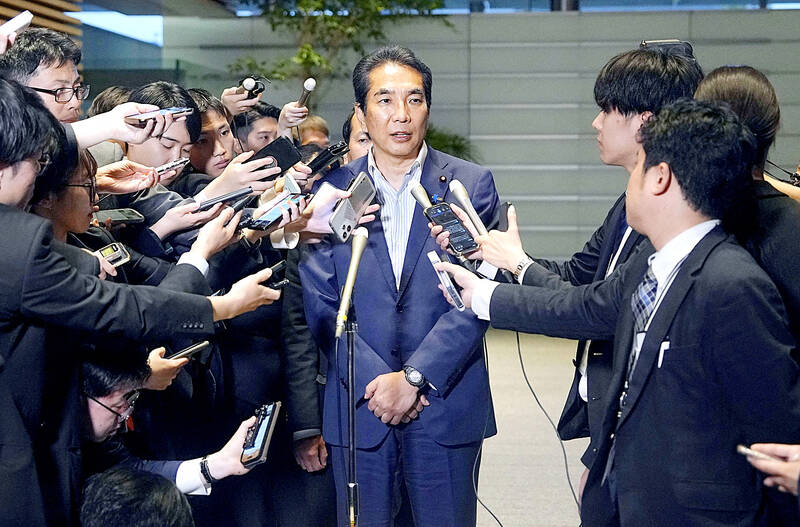Japanese Minister of Agriculture, Forestry and Fisheries Taku Eto yesterday resigned after remarks he made about rice triggered a firestorm of criticism from voters and lawmakers, posing a fresh challenge to Japanese Prime Minister Shigeru Ishiba’s embattled government.
Eto has been in hot water since media reports exposed comments he made at a weekend political fundraising party that he had “never had to buy rice” thanks to gifts from supporters.
The comment led to a frenzy of criticism from voters, already angry about the historically high price of the staple food due to a poor harvest and elevated demand from a boom in tourism.

Photo: Kyodo via Reuters
“I made an extremely inappropriate remark at a time when citizens are suffering from soaring rice prices,” Eto told reporters after handing in his resignation at the prime minister’s office.
Ishiba appointed former minister of the environment Shinjiro Koizumi as his replacement, saying he was counting on his reform-minded stance to produce results.
“Mr Koizumi is someone who has experience, insights, and passion for reforms on agriculture and fisheries,” Ishiba said.
The doubling of rice prices from last year has become a top concern for Japanese voters, long accustomed to years of deflation and suffering from stubbornly low inflation-adjusted wages.
The government has been releasing rice since March from its emergency stockpile to tame prices, but that has had little effect.
Data on Monday showed supermarket rice prices rising again in the week through May 11, to ¥4,268 (US$29.71) for a 5kg bag, after falling for the first time in 18 weeks. The high prices have increasingly led to retailers and consumers seeking out cheaper, foreign rice.
Ishiba said prices should be between ¥3,000 and ¥3,999, and for that to happen, it was necessary to reverse the government’s policy for the past half-century of encouraging reduced production to keep prices steady.
“What’s on everyone’s mind right now are the soaring rice prices and anxiety over whether there’s enough of it in the market, and I want to dispel these concerns,” said Koizumi, whose father, Junichiro Koizumi, pushed through sweeping reforms and deregulation as prime minister in the 2000s.
The agriculture ministry “covers a wide range of responsibilities, but in my mind, what I need to focus on right now is simply rice. I’m going into this job with the mindset that I am essentially the ‘minister in charge of rice,’” he said.
Eto’s departure threatens Ishiba’s already shaky grip on power ahead of key upper house elections in July. His Liberal Democratic Party and its junior coalition partner Komeito lost their majority in the more powerful lower house in a snap election Ishiba called in October last year shortly after taking office.

Taiwan is projected to lose a working-age population of about 6.67 million people in two waves of retirement in the coming years, as the nation confronts accelerating demographic decline and a shortage of younger workers to take their place, the Ministry of the Interior said. Taiwan experienced its largest baby boom between 1958 and 1966, when the population grew by 3.78 million, followed by a second surge of 2.89 million between 1976 and 1982, ministry data showed. In 2023, the first of those baby boom generations — those born in the late 1950s and early 1960s — began to enter retirement, triggering

ECONOMIC BOOST: Should the more than 23 million people eligible for the NT$10,000 handouts spend them the same way as in 2023, GDP could rise 0.5 percent, an official said Universal cash handouts of NT$10,000 (US$330) are to be disbursed late next month at the earliest — including to permanent residents and foreign residents married to Taiwanese — pending legislative approval, the Ministry of Finance said yesterday. The Executive Yuan yesterday approved the Special Act for Strengthening Economic, Social and National Security Resilience in Response to International Circumstances (因應國際情勢強化經濟社會及民生國安韌性特別條例). The NT$550 billion special budget includes NT$236 billion for the cash handouts, plus an additional NT$20 billion set aside as reserve funds, expected to be used to support industries. Handouts might begin one month after the bill is promulgated and would be completed within

NO CHANGE: The TRA makes clear that the US does not consider the status of Taiwan to have been determined by WWII-era documents, a former AIT deputy director said The American Institute in Taiwan’s (AIT) comments that World War-II era documents do not determine Taiwan’s political status accurately conveyed the US’ stance, the US Department of State said. An AIT spokesperson on Saturday said that a Chinese official mischaracterized World War II-era documents as stating that Taiwan was ceded to the China. The remarks from the US’ de facto embassy in Taiwan drew criticism from the Ma Ying-jeou Foundation, whose director said the comments put Taiwan in danger. The Chinese-language United Daily News yesterday reported that a US State Department spokesperson confirmed the AIT’s position. They added that the US would continue to

One of two tropical depressions that formed off Taiwan yesterday morning could turn into a moderate typhoon by the weekend, the Central Weather Administration (CWA) said yesterday. Tropical Depression No. 21 formed at 8am about 1,850km off the southeast coast, CWA forecaster Lee Meng-hsuan (李孟軒) said. The weather system is expected to move northwest as it builds momentum, possibly intensifying this weekend into a typhoon, which would be called Mitag, Lee said. The radius of the storm is expected to reach almost 200km, she said. It is forecast to approach the southeast of Taiwan on Monday next week and pass through the Bashi Channel